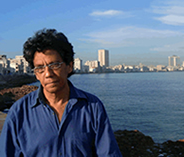
With this post I am inaugurating a weekly feature called, "Window into the Cuban Blogosphere," with entries from other Cuban bloggers who write from the Island. The diverse views and opinions of these bloggers will help Huffington Post readers understand the real Cuba, hidden behind the triumphalism and stereotypes of the official media and tourist propaganda. I open my window for all those who have managed, with each post, to make a crack in the wall of control.
An uncomfortable garment
By Reinaldo Escobar.
Cubans have read with optimism Barack Obama's speech in Cairo where he focused on the new American philosophy of international politics.
The center of gravity of that philosophy seems to be the tendency not to be a prisoner of the past and to focus more on what unites us than on what divides us, with the objective of finding a common space in which to live and work together in peace.
The American president used this constructive thinking to illuminate current conflicts of critical importance, particularly with regards to ethnic or religious differences.
On the theme of democracy, Obama said, "No system of government can or should be imposed by one nation by any other." He then elaborated on the basic ingredients of a democratic government adding, "And we will welcome all elected, peaceful governments -- provided they govern with respect for all their people." He was not explicit, however, about how his country would act towards those governments it does not welcome.
Clearly (and as he should) Obama outlines an international policy in accord with the interests of his country, understanding that among those interests global peace predominates. He stayed away from concerns stemming from the collection of nations grouped under the banner of Marxist-Leninist ideology. The socialist camp, the Warsaw Pact, no longer exists and the conflict between capitalism and the communist system, which seemed so often to be the most antagonistic conflict of all times and one which could only be solved by the disappearance of one of the contenders, has ceased to be a first order concern for the United States.
The case of Cuba remains as a remnant of the Cold War. No one here uses the old language of the "dictatorship of the proletariat," and even in his speech for the 50th anniversary of the Cuban Revolution Raul Castro omitted any allusion to Marxist ideology or remembered to comment on its role in building socialism. At the same time, he has made no public renunciation of those postulates, which end with the desired purpose of sweeping capitalism from the face of the earth.
The common ground that might be of interest to both the governments of Cuba and the United States is reduced to the problems of migration, the fight against drug trafficking, and collaboration in the event of national disasters. The recent rudeness from the Cuban government about the possibility of joining the OAS shows how far we are from regional integration.
Maybe that's why we can't get the garment that was exhibited on the catwalks of Cairo. Because for the Cuban government, which continues to measure its relations with its northern neighbor by our differences, the cycle of suspicion and discord shows no sign of coming to an end. Nor is there any sign of even wanting to turn the page on a history whose principal source of glory is in the chapters on confrontation. We are prisoners of the past because only it legitimizes our rulers' permanence in power.

Reinaldo Escobar has been an independent journalist since 1989, when he was fired from the daily newspaper Juventud Rebelde, for "denying the work of the Revolutionary program, exalting in the contradictions between the younger generation and those who held leadership positions in the country, and using ambiguous terminology that gave [his] articles a double meaning." Escobar, born in 1947, received his degree in Journalism from the University of Havana in 1971. He can be reached at: reinaldoescobar@desdecuba.com
His blog, Desde Aqui (From Here), is available in English Translation here.
